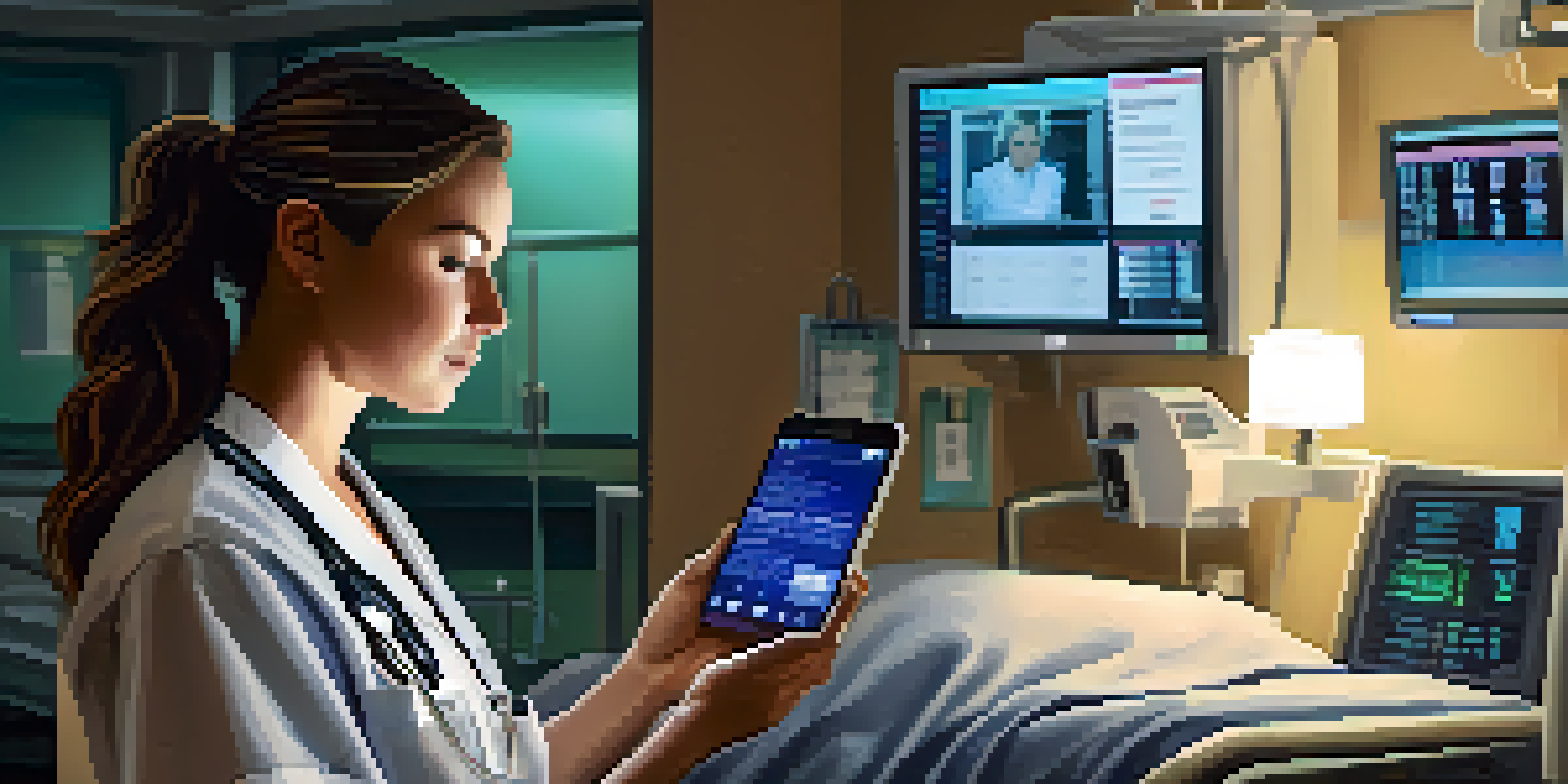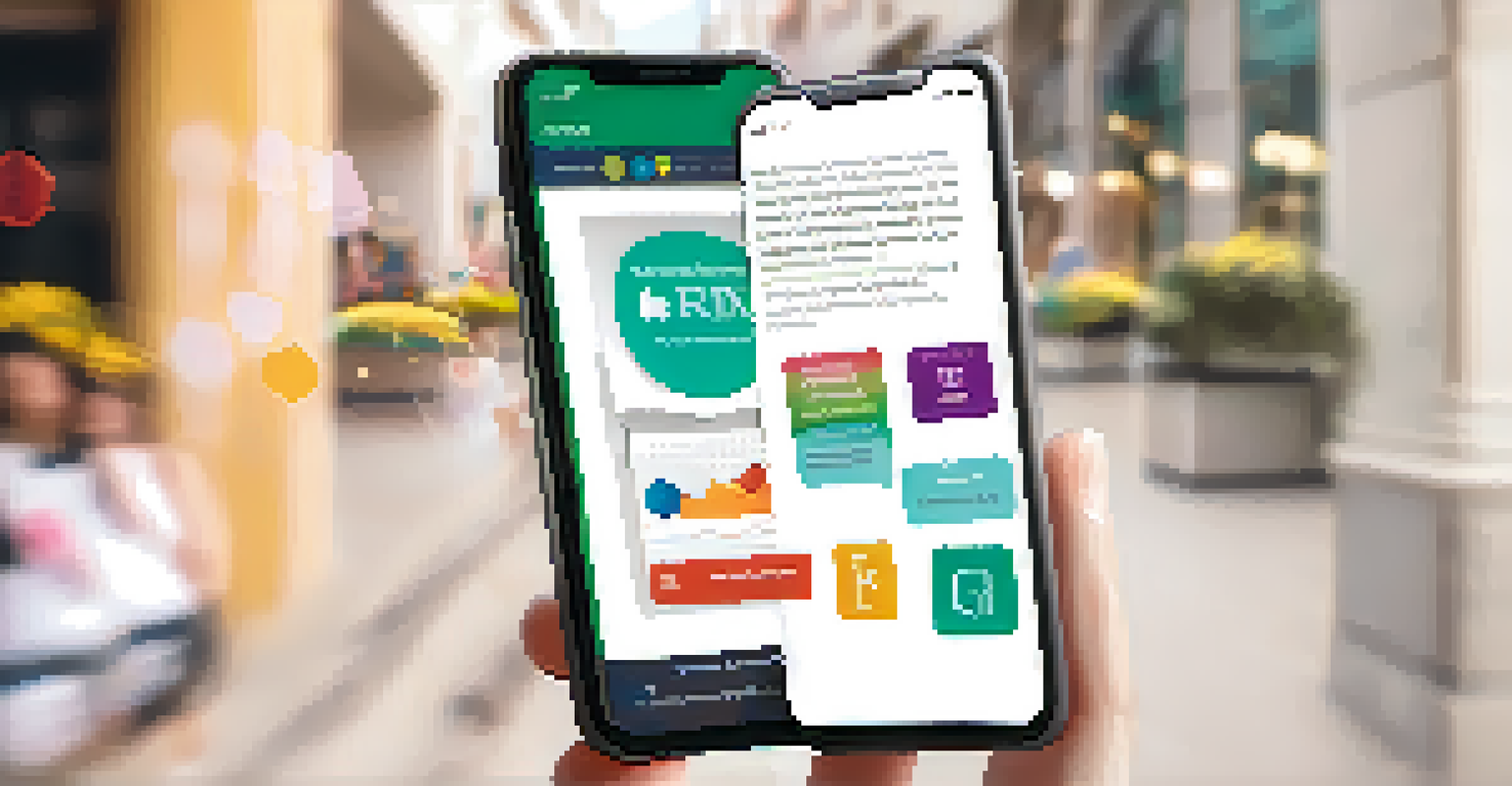Mobile Learning for Health Education: Promoting Wellness Anytime

Understanding Mobile Learning in Health Education
Mobile learning, or m-learning, refers to educational experiences delivered via mobile devices. This approach is gaining traction in health education, allowing learners to access vital information anytime and anywhere. By leveraging smartphones and tablets, health education becomes more accessible, particularly for those who may not have the opportunity to attend traditional classes.
Mobile learning provides the flexibility and accessibility that health professionals need to enhance their knowledge and skills on the go.
Imagine a nurse on a night shift who can quickly pull up a medical guideline on her phone. This not only enhances her ability to provide care but also keeps her updated on the latest protocols. With mobile learning, health professionals can stay informed in real-time, which is crucial in a field where information rapidly evolves.
Moreover, m-learning caters to various learning styles, offering videos, quizzes, and interactive content. This flexibility can lead to better retention of knowledge and improved practical skills, ultimately benefiting patient care.
Benefits of Mobile Learning for Health Professionals
One of the primary benefits of mobile learning for health professionals is its convenience. Busy schedules can make it challenging to find time for education, but with mobile learning, professionals can study during breaks or commutes. This ease of access helps integrate continuous education into daily routines, promoting lifelong learning.

Additionally, mobile learning can enhance collaboration among healthcare teams. For instance, practitioners can easily share resources, discuss cases, or participate in online forums. This not only strengthens teamwork but also fosters a community of learning that can lead to better health outcomes.
Mobile Learning Enhances Accessibility
Mobile learning provides healthcare professionals and patients with convenient access to educational resources anytime and anywhere.
Lastly, mobile learning can improve patient care by equipping healthcare workers with the latest evidence-based practices. When professionals are knowledgeable and confident in their skills, they can provide higher-quality care, positively affecting patient satisfaction and health results.
Engaging Patients through Mobile Health Education
Mobile learning isn't just for healthcare professionals; it's also an effective tool for patient education. Patients can access information about their conditions, medications, and healthy lifestyle choices right from their phones. This empowerment encourages patients to take an active role in their health management.
Empowering patients through mobile education transforms them into active participants in their own health management.
For example, consider a patient diagnosed with diabetes who uses a mobile app to track their blood sugar levels. This app can provide educational resources on diet and exercise, helping the patient make informed choices. The ability to learn about their condition at their convenience helps patients feel more in control of their health.
Additionally, mobile health education can facilitate reminders for medication and appointments, reducing the chances of missed doses or visits. By engaging patients through technology, health education becomes a more interactive and supportive experience.
Challenges of Implementing Mobile Learning in Health Education
Despite its advantages, implementing mobile learning in health education does come with challenges. One significant barrier is the digital divide, where some individuals may lack access to smartphones or reliable internet. This can create disparities in education and limit the benefits of mobile learning for certain populations.
Another challenge is ensuring that the content delivered through mobile platforms is accurate and up-to-date. Health information is constantly changing, and it's crucial that educational materials reflect the latest research and guidelines. Therefore, organizations must invest in regularly updating their mobile resources to maintain credibility.
Challenges Include Digital Divide
Despite its benefits, mobile learning faces challenges like the digital divide and the need for accurate, updated content.
Lastly, the effectiveness of mobile learning can be hindered by a lack of engagement. If learners do not find the content interactive or relevant, they may lose interest. To combat this, developers need to create engaging and personalized learning experiences that resonate with users.
Designing Effective Mobile Learning Programs
Creating an effective mobile learning program involves understanding the target audience and their specific needs. Tailoring content to address the relevant topics and skills ensures that learners find value in the material. Conducting surveys or focus groups can help gather insights into what users want from their mobile learning experience.
Incorporating multimedia elements like videos, infographics, and interactive quizzes can significantly enhance engagement. For instance, a short animated video explaining a complex health topic can make it much easier to understand. This variety caters to different learning preferences, making the program more inclusive.
Moreover, offering rewards or gamification elements can motivate learners to participate actively. By turning learning into a fun and rewarding experience, organizations can foster a culture of continuous education among health professionals and patients alike.
Case Studies of Successful Mobile Learning in Health
Several organizations have successfully implemented mobile learning programs that highlight its effectiveness in health education. One notable example is the use of mobile applications for training healthcare workers in low-resource settings. These apps provide essential training on best practices, enabling workers to deliver quality care despite limited resources.
Another case study involves a hospital that introduced a mobile platform for patient education. Patients reported feeling more informed and engaged in their treatment plans after using the app. This led to improved compliance with medication and follow-up appointments, showcasing the positive impact of mobile learning on patient outcomes.
Future Innovations Drive Engagement
Emerging technologies like AR, VR, and AI are set to enhance mobile learning experiences, making education more personalized and effective.
These case studies demonstrate that when mobile learning is executed thoughtfully, it can lead to significant improvements in both professional development and patient care. As more organizations explore this avenue, the potential for mobile learning in health education continues to grow.
The Future of Mobile Learning in Health Education
The future of mobile learning in health education looks promising, with technological advancements set to enhance its capabilities. Innovations like augmented reality (AR) and virtual reality (VR) could provide immersive learning experiences, allowing health professionals to practice skills in a simulated environment. This hands-on approach can be invaluable for surgical training or emergency response scenarios.
Moreover, the integration of artificial intelligence (AI) can personalize learning experiences, adapting content to suit individual learning paces and styles. For instance, an AI-driven app could analyze a user’s progress and suggest additional resources or topics to explore, ensuring a tailored educational journey.

As mobile learning continues to evolve, it has the potential to bridge gaps in health education and improve access to critical information. By embracing these innovative technologies, we can support a healthier future for both healthcare providers and patients.